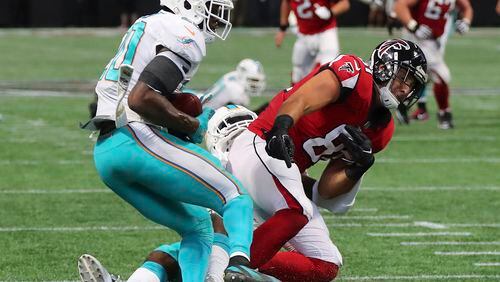That offseason happy talk has been revealed as just talk. The Falcons’ raging offense has indeed regressed under Steve Sarkisian. Their fast 'n furious defense remains a mediocrity. They’re 3-2 after five games, and that record flatters them. If not for a dropped pass in Chicago and a replay overturn in Detroit, they’d be 1-4.
Through five games last year, the Falcons were 4-1. They’d won in Oakland and New Orleans and, in consecutive weeks, beaten both participants from the previous Super Bowl. This time a year ago, they were stamping themselves as Super. You might recall that game itself unraveling on them. Don’t look now, but the team that blew the mother of all leads just blew another.
For the record, they led Miami by 17 points at halftime Sunday, not by 25 with 17:07 remaining in regulation. For the record, Lady Gaga did not rappel from this closed roof. Still, it’s one thing to blow a massive lead against the greatest coach and greatest quarterback ever. To be outscored 20-0 at home and lose 20-17 to Jay Freakin’ Cutler … that’s about as bad as it gets in a regular-season game.
“We’re disappointed,” Dan Quinn said. “For us to be the team we can be, we’ve got to do better.”
The reigning NFC champs have been outscored 72-40 over the second halves of games this season. This same team, more or less, was outscored 31-0 by the Patriots over the final 17:06 of regulation plus overtime. For as much as we’ve been told that cosmic flop was behind the Falcons, can anything be behind anyone if it keeps happening every week?
These Falcons led by 10 with eight minutes remaining in Chicago; they won by six after fending off four goal-to-go plays. They led by 14 in the second quarter in Detroit; they won only because points were taken off the board and the final seconds ran off the clock. They led by three at the half against Buffalo; they mustered seven second-half points and lost by six. Now this, which means:
Five times in their past six games, the Falcons have either lost a lead or come within an eyelash of losing one. Is that not, er, a trend?
Quinn: “We can’t replay the game played in the Super Bowl. We can control what have now. That was a historic game, but we don’t look back to that one whenever we’re ahead or behind. We’re 100 percent about who we are and what we have now.”
That’s what he’s supposed to say, which doesn’t necessarily make it so. The men of Quinn keep inventing ways to lose, from not running the ball with a huge lead in the Super Bowl to not running it on fourth-and-1 against Buffalo. Sunday’s misdeeds included giving back Deion Jones’ interception after Grady Jarrett was flagged for roughing Cutler – and he did; he took two steps after the ball was thrown – and a punt snap that went where it wasn't supposed to go.
Later, the 5-foot-11 receiver Jarvis Landry would fight through six Falcons -- more than half a defense, we note -- for a vital first down on third-and-9. That yielded the winning field goal, though the Falcons had ample time to answer.
Matt Ryan converted third downs with passes to Justin Hardy and Austin Hooper. With 47 seconds left and the Falcons within range of a tying field goal, Ryan threw for Hooper inside the Miami 10. Cordrea Tankersley knocked the ball away. Reshad Jones, once a Georgia Bulldog, gathered it in. For the second time in two games, a final drive was thwarted within the shadow of the end zone.
Some of this is the nature of the NFL, which is skewed toward comebacks. No team holds the patent on winning every one-possession game. But this game got away in the third quarter, when the Dolphins scored 14 points and the Falcons made one first down. The once-raging offense took an 0-fer in the second half. At Quinn’s request, Sarkisian moved from the sideline to the coaches’ box for Sunday’s game; when next the Falcons play at Mercedes-Benz Stadium, their offensive coordinator might call plays from the Vine City MARTA station.
The belief in many circles was that the inevitable post-Shanahan slippage in points and yards would be offset by a better defense. Hasn’t worked that way. The Falcons still aren’t stopping people, and they can no longer count on simply outscoring opponents. They’ve managed three second-half offensive touchdowns in five games, the scorers of those being Hooper, Gabriel and Justin Hardy. Julio Jones remains pointless.
Said Ryan: “(Once) we worked our way out of field goal range (via a holding penalty and a sack). We have to come away with points in those situations.”
Then, going macro: “I think we need to score points offensively.”
Quinn: “Today was a case of some errors and some missed ops (DQ-speak for ‘opportunities.’) By no means is it systemic thing or (poor) game management.”
At its best, Quinn sees his team as being “fun to watch and tough as hell to beat.” The 2016 Falcons were. This edition isn’t, at least not yet.
Quinn again: “The answer to that question is consistency.”
Right now, though, all the Falcons do with consistency is waste leads. They’re 3-2 headed to New England. Here’s guessing the most famous partial score in the history of sports – 28-3 – will be mentioned a time or two.
About the Author







